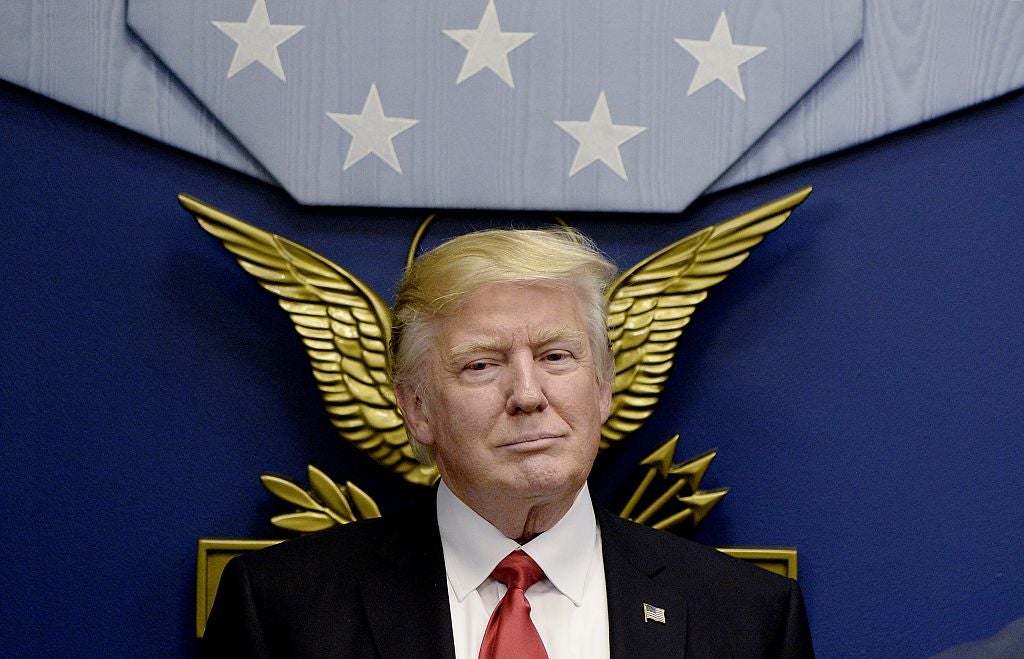The petition against Trump means that his state visit will be subject to the debate it deserves
To withdraw the invitation to come to Britain for a state visit would be the most almighty snub – indeed, a cancellation is almost inconceivable. Equally, any visit in the near future is likely to be met with protests on a scale that make those that greeted Chinese President Xi Jinping in 2015 seem positively low-key

Prime Minister Theresa May’s equivocal response to President Donald Trump’s immigration ban may provide one explanation for the popularity of an online petition that calls for the President not to be granted a state visit to the UK. While the PM’s spokesperson eventually confirmed that Downing Street did not agree with Mr Trump’s decision to halt immigration from seven predominantly Muslim countries, Ms May’s initial preference for a non-committal stance fuelled the anger of protestors. Having long ago passed a million signatories, the petition is becoming a symbol of liberal dissent.
There is, of course, an inherent danger with any petition that it becomes an end in itself – those who sign up feel satisfied that they have done their bit; those who take the contrary view disregard it as an exercise in skin-deep activism. Nevertheless, it is clear that the rage felt towards the nascent Trump administration is real and widespread. To dismiss it as virtue-signalling is as glib as it is disingenuous; to argue that Mr Trump is somehow beyond criticism because he has done no more than enforce campaign promises is both bizarre and deeply depressing.
Supporters of the Prime Minister have suggested that she was right to be cautious in responding to Mr Trump’s latest executive order, lest over-enthusiastic denunciation should imperil the details of a future trade deal. But the truth is, by falling back on the classic excuse that “another country’s borders are another country’s business”, Ms May simply showed how desperate she is not to offend the White House. After being at pains last week to explain how she would be a critical friend to the new President, it became clear from her blustering performance on Saturday that she is more like a needy acquaintance. At a moment when the Prime Minister should have offered a resolute verdict, her moral compass went sadly awry.
Now, with politicians of every party lining up to express their dismay at Mr Trump’s blunt immigration policy, the Prime Minister is caught between a rock and a hard place. To withdraw the invitation to come to Britain for a state visit would be the most almighty snub – indeed, a cancellation is almost inconceivable. Equally, any visit in the near future is likely to be met with protests on a scale that make those which greeted Chinese President Xi Jinping in 2015 seem positively low-key. Downing Street has thus far responded to criticism of the proposed visit by simply reiterating that the invitation has been extended and accepted – and it is not difficult to understand why it may say no more on the matter, hoping against hope that the Trump presidency’s early controversy proves a false portent.
Yet it is important that the Government does not ignore the anger that President Trump has provoked by his divisive and discriminatory policy. Fortuitously, the degree of support for the petition, which calls for Mr Trump’s state visit to be downgraded, makes it likely that the question will be debated in Parliament. And it is clear too that numerous politicians are prepared to speak up for the proposition: Jeremy Corbyn and Tim Farron have suggested that the invitation, given in haste, should be postponed. The SNP has registered opposition to the visit too, as have several leading Conservative figures including Ruth Davidson and Sarah Wollaston.
It is in Britain’s interests to maintain a positive relationship with America. But it is foolish in the extreme to conclude that the “special” bond must be preserved simply by dint of its strength in the past. Moreover, British influence is far more likely to be fortified in the world as whole if the country is seen as standing by justice and righteousness, rather than cowering behind the peculiar bouffant of a man who appears to regard such principles as utterly disposable.
Join our commenting forum
Join thought-provoking conversations, follow other Independent readers and see their replies
Comments
Bookmark popover
Removed from bookmarks